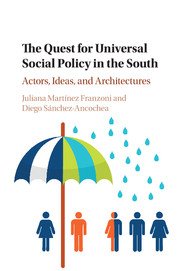Book contents
- Frontmatter
- Contents
- List of Figures
- List of Tables
- Acknowledgements
- List of Abbreviations
- Part I Universalism in the South
- Part II A Comparative Study of Policy Architectures
- Part III Building Universalism in Costa Rica
- 5 The Foundations of the Policy Architecture in the 1940s
- 6 Moving Further Towards Unification in the 1970s
- 7 Contradictory Moves under Market Pressures since the 1980s
- Part IV Conclusions
- References
- Index
6 - Moving Further Towards Unification in the 1970s
from Part III - Building Universalism in Costa Rica
Published online by Cambridge University Press: 10 November 2016
- Frontmatter
- Contents
- List of Figures
- List of Tables
- Acknowledgements
- List of Abbreviations
- Part I Universalism in the South
- Part II A Comparative Study of Policy Architectures
- Part III Building Universalism in Costa Rica
- 5 The Foundations of the Policy Architecture in the 1940s
- 6 Moving Further Towards Unification in the 1970s
- 7 Contradictory Moves under Market Pressures since the 1980s
- Part IV Conclusions
- References
- Index
Summary
Introduction
By the early 1970s a growing number of Costa Rican workers and their families received equal, generous social benefits. Yet Costa Rica's social policy architecture still confronted major limitations. On the one hand, health care insurance was underfunded. On the other hand, the poor and the self-employed had “second class” access to curative health care services and lacked protection in old age. Many high-income workers were also uninsured. Had the architecture remained restricted to salaried workers and their families, Costa Rica would not have become an exceptional case of universalism in the South.
During the crucial decade of the 1970s, these problems were largely resolved thanks to three interrelated changes. First, by eliminating wage ceilings in payroll contributions, mandatory social security extended to high income groups and temporarily tackled its funding problems. Second, the transfer of all hospitals to the Caja Costarricense del Seguro Social (Costa Rican Social Insurance Agency, CCSS or Caja) enhanced the unification of service provision and created incentives for the incorporation of the poor to social insurance. Third, this incorporation was also facilitated by new programs such as rural and community health, which were funded through a path-breaking social assistance fund (Fondo de Desarrollo Social y Asignaciones Familares, FODESAF). Created in 1975, FODESAF generated a new income stream that enabled institutions such as the Ministry of Health and the Caja to reach the poor. Funded benefits included non-contributory pensions and preventive and primary health care as well as school luncheons and technical training. Unlike the social assistance funds created across Latin America after 1982, FODESAF funded affirmative action measures without fragmenting benefits into a two-tier system.
How did Costa Rica manage to eliminate wage ceilings, thus increasing the tax burden for some of the most powerful groups in society? Why was the restructuring of health care – a difficult bureaucratic undertaking – successful? How were the poor incorporated to the same programs as the rest of the population? We acknowledge the contribution made by electoral competition, social pressures, and progressive partisanship in the context of a volatile international environment. Progressive politicians in Costa Rica and abroad were responding to growing social mobilization in the rural sector and to international pressures to deal with the “communist threat.”
- Type
- Chapter
- Information
- The Quest for Universal Social Policy in the SouthActors, Ideas and Architectures, pp. 123 - 150Publisher: Cambridge University PressPrint publication year: 2016



